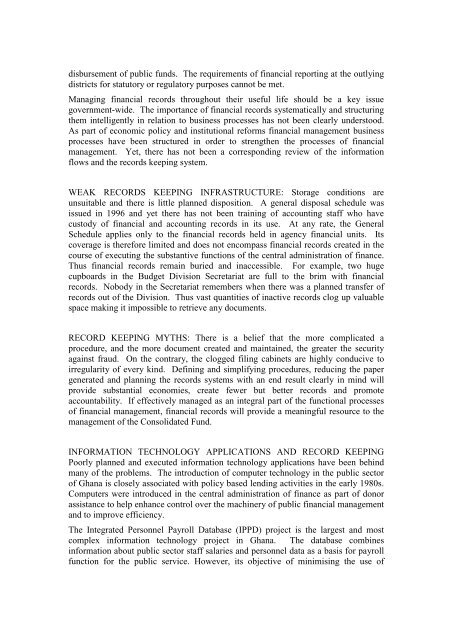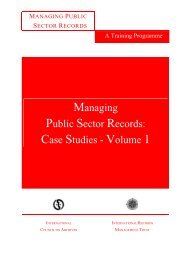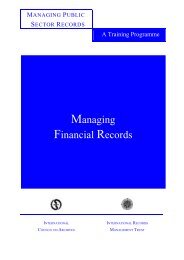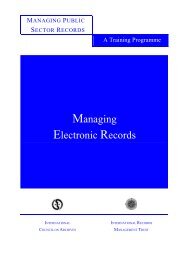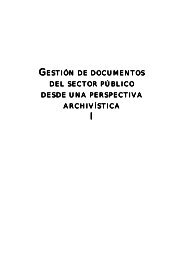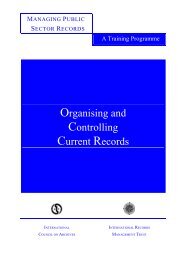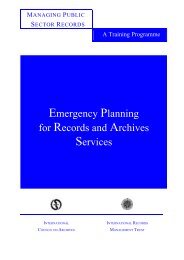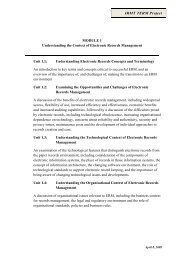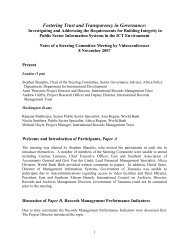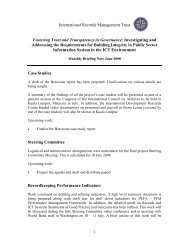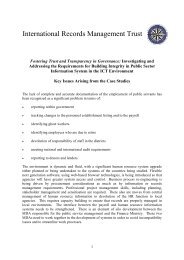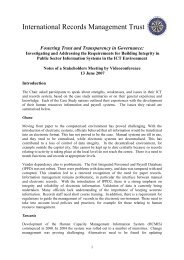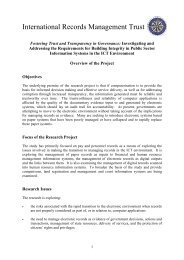managing public sector records: a study programme - International ...
managing public sector records: a study programme - International ...
managing public sector records: a study programme - International ...
Create successful ePaper yourself
Turn your PDF publications into a flip-book with our unique Google optimized e-Paper software.
disbursement of <strong>public</strong> funds. The requirements of financial reporting at the outlying<br />
districts for statutory or regulatory purposes cannot be met.<br />
Managing financial <strong>records</strong> throughout their useful life should be a key issue<br />
government-wide. The importance of financial <strong>records</strong> systematically and structuring<br />
them intelligently in relation to business processes has not been clearly understood.<br />
As part of economic policy and institutional reforms financial management business<br />
processes have been structured in order to strengthen the processes of financial<br />
management. Yet, there has not been a corresponding review of the information<br />
flows and the <strong>records</strong> keeping system.<br />
WEAK RECORDS KEEPING INFRASTRUCTURE: Storage conditions are<br />
unsuitable and there is little planned disposition. A general disposal schedule was<br />
issued in 1996 and yet there has not been training of accounting staff who have<br />
custody of financial and accounting <strong>records</strong> in its use. At any rate, the General<br />
Schedule applies only to the financial <strong>records</strong> held in agency financial units. Its<br />
coverage is therefore limited and does not encompass financial <strong>records</strong> created in the<br />
course of executing the substantive functions of the central administration of finance.<br />
Thus financial <strong>records</strong> remain buried and inaccessible. For example, two huge<br />
cupboards in the Budget Division Secretariat are full to the brim with financial<br />
<strong>records</strong>. Nobody in the Secretariat remembers when there was a planned transfer of<br />
<strong>records</strong> out of the Division. Thus vast quantities of inactive <strong>records</strong> clog up valuable<br />
space making it impossible to retrieve any documents.<br />
RECORD KEEPING MYTHS: There is a belief that the more complicated a<br />
procedure, and the more document created and maintained, the greater the security<br />
against fraud. On the contrary, the clogged filing cabinets are highly conducive to<br />
irregularity of every kind. Defining and simplifying procedures, reducing the paper<br />
generated and planning the <strong>records</strong> systems with an end result clearly in mind will<br />
provide substantial economies, create fewer but better <strong>records</strong> and promote<br />
accountability. If effectively managed as an integral part of the functional processes<br />
of financial management, financial <strong>records</strong> will provide a meaningful resource to the<br />
management of the Consolidated Fund.<br />
INFORMATION TECHNOLOGY APPLICATIONS AND RECORD KEEPING<br />
Poorly planned and executed information technology applications have been behind<br />
many of the problems. The introduction of computer technology in the <strong>public</strong> <strong>sector</strong><br />
of Ghana is closely associated with policy based lending activities in the early 1980s.<br />
Computers were introduced in the central administration of finance as part of donor<br />
assistance to help enhance control over the machinery of <strong>public</strong> financial management<br />
and to improve efficiency.<br />
The Integrated Personnel Payroll Database (IPPD) project is the largest and most<br />
complex information technology project in Ghana. The database combines<br />
information about <strong>public</strong> <strong>sector</strong> staff salaries and personnel data as a basis for payroll<br />
function for the <strong>public</strong> service. However, its objective of minimising the use of


